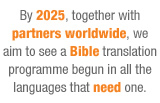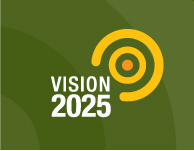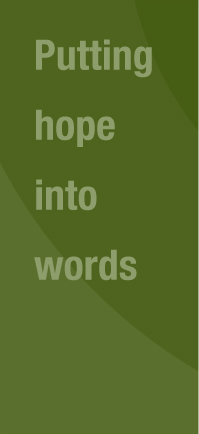|
The Blank Book - 10/40 window
Korta* - 10/40 Window
Hebrews
Cost:
£6800/$12250/€9500
Population: Approx 74,000
Main Industry: Subsistence farming
(* Not real name)
The Korta come from a very hilly area with stretches of flat plain between the hills. Over the years the hills have been a place of refuge for many different peoples, who would retreat to the hilltops in times of danger and then extend their farming on to the flat land in peaceful periods. On the plains they tend to come into conflict with other groups who need pasture for their cattle.
The Korta also keep some cattle and farm. Most of their diet consists of their own farm produce. For income they sell groundnuts, sesame and sometimes cattle; but they are not rich people. Some have migrated to towns and cities to work, but it is said that even when a Korta person is away from his homeland, his mind and heart are still there.
Their family structure consists of the extended family in which a man’s grown up sons bring their wives to live with them in their father’s home. The married couples, as well as unmarried adults, have their own huts but share many things together. Every family is part of a clan, the other unit of social importance.
The Korta enjoy socialising and usually get on well within their own group and with neighbouring peoples. They rely on one another for protection.
Tradition is extremely important to the Korta and they hold firmly to it. They are not very receptive to those who try to change their culture. This affects the way they view Christianity, which is still considered a foreign religion by many because it has not been presented in their own cultural context. The gospel will only catch on if it is in Korta language.
The majority of the Korta practise their traditional religion and are resistant to any change. About 50 years ago a mission school was started in the town of Korta. For the first time, school education was brought within the reach of local people, who had previously been at an educational disadvantage in their own country. Through the school and local evangelism a small church was established. The church feel acutely their lack of the Scriptures and other Christian literature in the people’s own language.
A small team is working on the translation of the New Testament into Korta and literacy classes have been set up. This is vitally important, because, as they can't understand the Bible
in any other language, the church cannot grow to maturity or expand in numbers.
Help fill the Blank Book
|
|
 |


Workers from Africa, Asia and Latin America are stepping forward to take up the responsibilities and challenges of Bible translation in languages in their countries. While many are willing, national translators need help. Training, technical and financial support are necessary for them to succeed. Translated Scripture is checked for clarity and accuracy. The results? Another people group receiving God’s message in their own heart language!
The Blank Book enables you to connect with Bibleless people groups around the world. The Blank Book is a way to help you help others by supporting the translation of a book of the Bible into their language.
Every year, the project workers plan ahead and if translation is possible will start one or more books of the Bible. We look for these new starts and through the Blank Book try to get complete funding for some or all those books. Each book will need to be drafted and go through a number of checks with consultants and local speakers. The drafting and checks will take some time, even years. This will vary according to context.
Help fill the Blank Book in the 10/40 window
Look at a Blank Book in Africa
Look at a Blank Book in Asia
Help fill where most needed
The Blank Book - frequently asked questions
|



